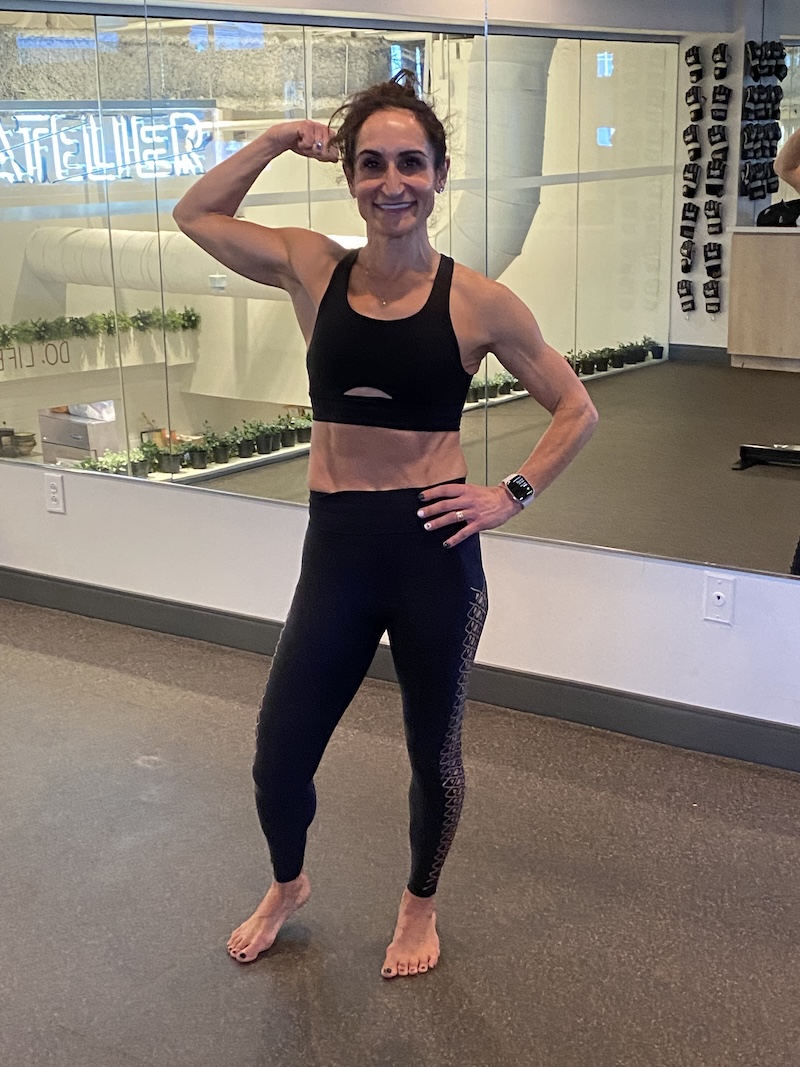With Philomena Salvemini Hilton, MD, FACOG, Tryon Medical Partners
Menopause is a transformative phase of a woman’s life, signaling the end of one chapter and the beginning of another. Amidst the hormonal fluctuations that come with this transition, learning how to exercise for menopause becomes not just a choice but a crucial element in navigating through this period with grace and vitality.
Tryon Medical Partners gynecology specialist Dr. Philomena Salvemini offers her insights, practical tips, and a touch of motivation to help you not only endure but also thrive through this journey.

#1. Just keep moving
As women approach menopause in their 40s, big changes begin to happen hormonally. Levels of the testosterone and progesterone hormones begin to dip, which impacts the body’s metabolic rate, as well as the ability to build muscle. Additionally, it’s common to experience poor sleep during menopause causing levels of the cortisol hormone to spike, further disrupting metabolism. These hormonal changes have a large impact on how exercise feels and its results. Even if your exercise regime remains exactly the same, your muscle tone may not develop the same way and you may experience “menopause belly”, an increase in hormonal stomach fat.
Although the impact of exercise may be different, it’s incredibly important to keep exercising through these changes. Women lose about 1% of their muscle mass each year after they turn 40 and with the decreasing muscle mass, balance often becomes an issue. Exercise can counter these symptoms of menopause, as well as lack of energy, anxiety, depression, and trouble sleeping.
“I often hear from women in their 40s that they’re gaining weight but still have their period,” Dr. Salvemini notes. “The hormonal changes of menopause may begin while you’re still menstruating. As a postmenopausal woman myself, I understand how difficult these changes can be to navigate. The most important thing to remember is to keep moving.”
#2. Stay flexible and reconsider what kind of exercise for menopause makes sense
Dr. Salvemini emphasizes that being fluid through the transitions, and riding the wave of change, is critical in meeting your body where it is. This often means that the exercises you’re doing could, and potentially should, change.
Dr. Salvemini recommends the following as some of the best exercises for menopause:
- In your 40s, focus on:
- Weight Training.
- What is it? This could look like lifting weights or using resistance bands to increase muscle mass. The more you can combat decreasing muscle mass during menopause, the better. More muscle mass means better balance and a higher metabolic rate.
- How frequently? Two to three times a week is ideal, but any amount of exercise is better than none.
- HIIT (High Intensity Interval Training).
- What is it? This is characterized by alternating short periods of intense or explosive exercise with brief recovery periods, such as jumping jacks, pushups, and planks.
- How frequently? Two to three times a week is ideal, but any amount of exercise is better than none.
- Weighted Cardio.
- What is it? While many women enjoy cardiovascular-intensive exercises to keep their body moving (for instance, running), weight training is best for menopausal women. In order to make your cardio menopause-friendly, Dr. Salvemini recommends incorporating weights, such as ankle or wrist weight bracelets.
- How frequently? Only two to three times a week maximum, and ideally for only 20-30 minutes.
- Weight Training.
- In your 50s, 60s, and 70s, prioritize:
- Functional Training. People are living longer and want to keep up their quality of life. Functional training is critical in supporting this through maintaining balance and muscle mass.
- What is it? Functional fitness is a type of exercise that supports the movements of everyday life, such as walking, pushing, pulling, bending, squatting, lunging, and core exercises. Yoga and pilates classes promote these movements and also help with flexibility.
- How frequently? Two to three times a week is ideal.
- Functional Training. People are living longer and want to keep up their quality of life. Functional training is critical in supporting this through maintaining balance and muscle mass.
“It’s critical to listen to your body and transition appropriately,” Dr. Salvemini encourages. “While in your 30s and 40s HIIT workouts may keep you fit and happy, the same exercises could spike your cortisol levels in your 50s, 60s, and 70s, making them no longer ideal.”
#3. Consider other lifestyle adjustments to ease the transition
Exercise is a critical piece of the puzzle in managing the menopause journey, but other resources are also available. For instance, hormone replacement and nutritional choices can help reap the most benefits from exercise for menopause.
In terms of adjusting your diet, Dr. Salevmini recommends:
- Being proactive. Menopause causes cravings for refined sugars and your body will become less forgiving to its impacts. Be gentle with yourself about these cravings, as they’re normal, but also be aware and proactive in acknowledging them before they get out of hand.
- Cutting out gluten and dairy. You can’t out-exercise a bad diet and post-menopause, your body is much less forgiving to gluten and dairy. While they may be fine for some individuals, others may want to consider cutting down or even cutting out gluten and dairy.
- Reevaluating your relationship with alcohol and caffeine. Especially after menopause, your body will struggle to metabolize alcohol and caffeine. While this may not mean cutting them out entirely, everyone should be cognizant of their own happy medium.
- Incorporating healthy additions. Omega-3s are very helpful in your diet (often found in chia, flax, fish oil, salmon, and sardines) and a plant-based diet can help your body transition through menopause. Animal proteins can cause additional hormonal problems, so cutting down on a heavy meat diet may be a good idea.
“Honor and respect the transition your body is going through,” says Dr. Salvemini. “You’re not alone. If you’re experiencing some worrying symptoms like rapid weight gain or prolonged periods of bleeding, go visit your clinician who will be happy to make sure your menopausal journey is as safe and comfortable as possible.”
Visit the Tryon Medical Partners website to learn more about staying healthy, fit, and comfortable throughout menopause.
Tryon Medical Partners is an independent medical practice dedicated to maintaining trusted patient-doctor relationships, providing excellent and personalized care, and giving you the choices in healthcare that you deserve. With eight convenient locations throughout Charlotte, Tryon Medical Partners specializes in primary care as well as cardiology, dermatology, gynecology, endocrinology, gastroenterology, pulmonary, rheumatology and sleep medicine.

